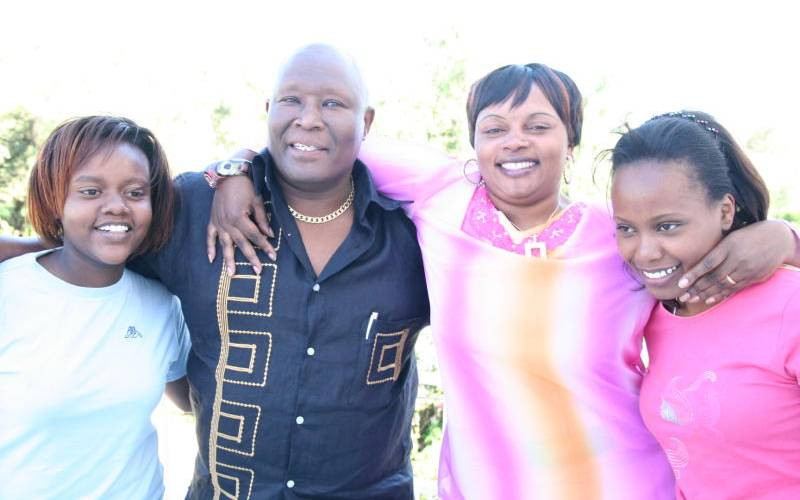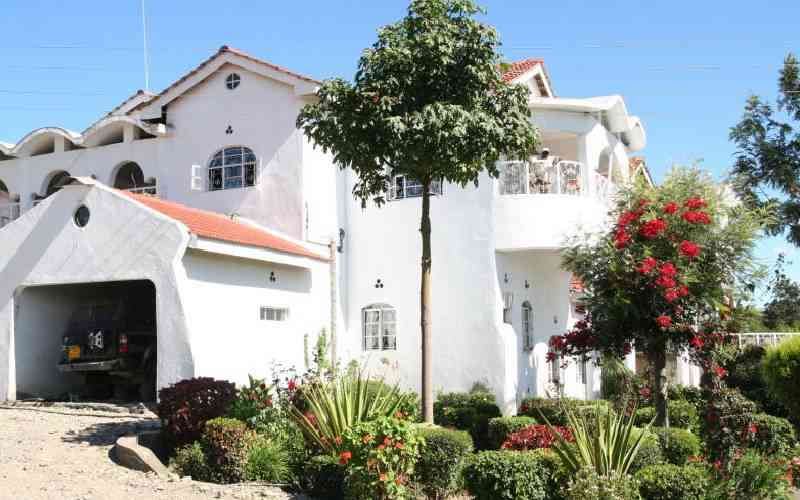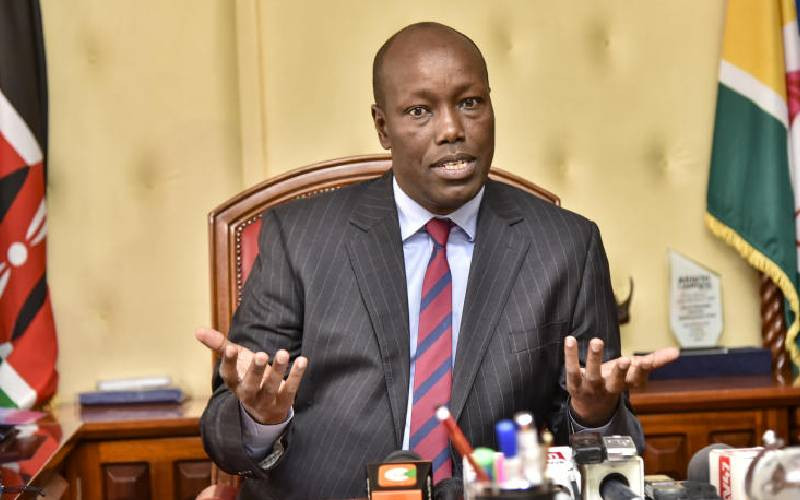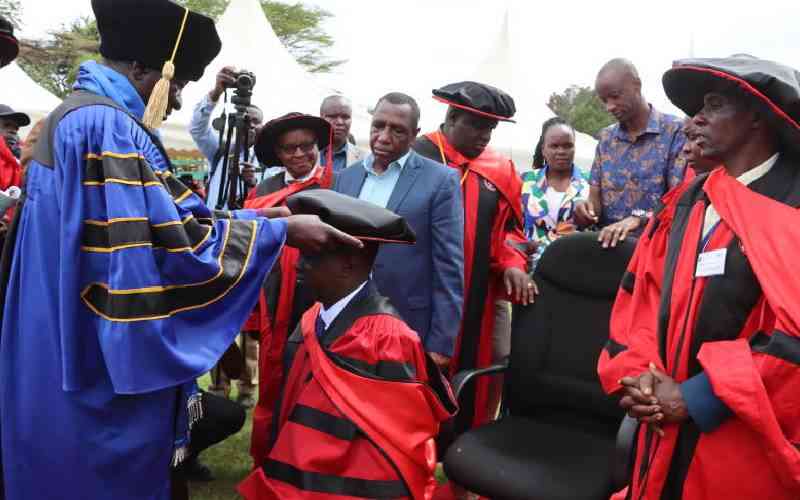
In 2003, businessman Fai Amario, born Peter Gilbert Njoroge Ng'ang'a, declared his candidature for the Naivasha parliamentary seat that had fallen vacant following the death of the newly-elected MP, Paul Kihara.
One morning, at the height of the political campaigns, Amario, now deceased, walked into a local bank dressed in a short and T-shirt while sipping a cold beer. Guards saluted him, and bank staff almost fell on their knees to serve him.
A former bank teller said Amario withdrew a huge amount of money and carried the cash across the streets to his car, as residents watched in disbelief.
He dumped the cash in the back seat of the car and drove off.
Despite the high crime rate in the town at that time, no one would dare attack Amario or even get closer to his car. Amario elicited fear, loath and respect in equal measure.
To his family and friends, he was a representation of love, but to the police, Amario was a criminal who deserved nothing but a long jail term.
Amario was almost always in controversy. When he was not clashing with the police, he was mingling with locals over a drink, regardless of their status.
Fourteen years after his death, memories of Amario still linger on, especially in Naivasha constituency where he had established his business empire.
Lying in ruins
Many of his investments are now wasting away or lying in ruins.
The popular Fai's Den, along the Naivasha-Mai Mahiu Road, off the Moi South Lake Road, where his brewery stood, is in ruins.
The hotel that was a preferred destination by many who visited Naivasha was closed down many years ago.
Flamboyant, eccentric and daring, Amario captured the imagination of Kenyans with his unrestrained and lavish lifestyle.
Recently, after the High Court in Nakuru distributed his Sh760 million estate to his ten beneficiaries, Amario's memories were rekindled.
Those who knew him recalled his outlandish, colourful personality and sense of entitlement that set him apart.
"Fai Amario was different, no doubt. The man was not a Muslim but insisted on the prefix Al-Haj before his name," recalled Peter Theuri, 47, who worked at his wine distillery in Naivasha.
He describes Amario's life as a mystery. He recalled one day while addressing a staff meeting at the distillery when Amario retorted: "When you are different, people call you crazy. It does not mean I am sick and I should be hospitalized... I am just different."
Theuri said Amario made the remarks after people started questioning his mental state. This was after placing an advertisement in the newspapers seeking a wife to marry. "That move was shocking and people started questioning his sanity," recalled Theuri.
Family members
Close family members who spoke to the Saturday Standard said Amario was born in April 1954 in Banana, in the then Kiambu district, as the only child in his family.
"He later changed his name in his teenage years to Fai Omar Amario because he considered his birth name 'too mundane'," said a close relative, who only identified himself as Joseph.
Joseph revealed the name Fai is the initials of a "chemical formula of a Spanish wine," while Amari means, "a vas, barren vineyard."
He said Amario was born into a humble family. His mother was a casual labourer at Mbiyu Koinange's farm in Kiambaa, Kiambu County.
Koinange was the first Kenyan to earn a Master's degree and served as Minister of State in the government of the late Mzee Jomo Kenyatta.
"Amario's father worked as a loader in one of the late Njenga Karume's businesses," Joseph. The late Karume later served as Minister of State in President Mwai Kibaki's administration.
Amario attended Thimbigwa Primary School in Kiambaa, where he skipped from Class Two to Class Four. From Class Four, he joined Starehe Boys Center in 1969.
Joseph says Amario was an obedient child, who loved attending church.
In previous interviews, Amario was so tiny while at Starehe Boys Center that he was nicknamed "Zakayo" and the "French Scientist" for his fluency in the language and his aptitude in mathematics and chemistry.
In an interview in 2004, the late Yusuf King'ala, the then Starehe's deputy director and Amario's former classmate, recalled; "He was not loud but would be slippery and mischievous. He was reserved and did things his way."
"One day when Amario was asked what he wanted for a Christmas gift, he requested books on wines and winemaking," said the late King'ala.
According to available records, Amario left Starehe in 1975.
In 2000, Amario was one of the former students who attended the Founder's Day celebrations and sat at the VIP dais, where Wiper leader Kalonzo Musyoka, the guest of honour, and the late Dr Geoffrey Griffin, the director and school founder, sat.
During the event, people could not help but notice his dressing. His was in a black farmer's cap, white Chinese collar shirt with gold trimming and the button fold, shiny black shoes, and broken suit.
Soon after, Dr Griffin, who died in 2005, said he could not remember Amario, although, from the stories he was reading about him at the time, Amario could not have passed as a true representative of a Starehe old boy, referring to Amario's run-ins with the police, and conviction for robbery with violence.
From Starehe, Amario was admitted to the University of Nairobi to study pharmacy. However, it was claimed he dropped out after only one semester, terming what was being taught as "a waste of time".
He secured a job at shoe polish company in Nairobi, rising through the ranks to the position of quality controller to, factory manager.
At the time, Amario became a shylock, lending money for profit to his broke workmates. He left employment after three years.
Later, Amario established a shoe polish manufacturing company, named Dush Shoe Polish, earning himself another nickname - "Dush."

He was making and marketing his shoe polish. Since shoe polish, at the time, was only sold at the beginning of new school terms, Amario closed shop and ventured into candle and ink-making business.
Alcohol business
In the early 80s, Amario founded an alcohol business in Naivasha. He produced Rumulika (derived from rum and liquor), a pineapple-based wine - under the banner of Amarillo wineries. But after 12 years later, he took a break and gained more knowledge when he enrolled at the Israel Wine Institute in Rehevot.
He returned to Kenyan and began distilling brands such as Amario's Sherry, Pooler, Medusa, Uhuru 2000, Kata Pingu, Mahewa and Cantata.
He established a wide wine and spirit distribution network in Mt Kenya and parts of the Rift Valley.
Amario's products adopted interesting marketing gimmicks such as pictures of his hand-cuffed self in a farmer's cap, locally referred to as the "Jaramogi" cap.
Stickers of the plastic wine bottles read; "Drink Amario's Sherry and know why birds fly."
The most enduring storu about Amario's life is when he placed adverts in all major newspapers seeking a wife to marry. The qualities he was looking for were not just physical beauty but impressive academic credentials to boot.
He later decided to join politics and is best remembered for disrupting a political rally that was being addressed by Ida Odinga, wife of the then PM Raila Odinga. That was in 2003 when Amrio and his supporters stormed the meeting.
In 1996, Amario was a subject of controversy after being accused of murdering his two employees. One of those killed was Gitau Karago, a deputy manager at one of his depots in Central Kenya.
Court records of the murder trial show Karago was said to have called Amario in late 1995 to inform him that Sh212,000 was missing from his sales. In response, Amario sacked Karago together with one Makimei Njoroge, who was the depot manager. A week later, Karago was found dead in Naivasha with a six-inch nail hammered into his head.
Njoroge, who was found unconscious, survived and identified Amario as one of his attackers.
In 2004, CID officers raided Amario's Naivasha home over suspicion of murdering his wife, Sarah Wanjiru. Wanjiru was suspected to have been buried in the highly secured compound. But after digging for hours, the officers were shocked to discover various motor vehicle parts buried in the compound.
Also discovered were ten unlicensed shotguns, seven brand new but dismantled Toyota Prado and Mitsubishi four-wheel drive vehicles, as well as around 20 computers.
In 2005, Amario was sentenced to nine years at Kamiti Maximum Prison. He threatened the magistrate and police officers handling his case. He would be offered extra security by the state.
But the worst was to come when the tycoon was charged with robbing businessman Mulraj Kanji Patel of his USV car, a Toyota Land Cruiser, two rust watches, a gold necklace, a bracelet, and two cell phones, all valued at Sh2.8 million. He was also accused of snatching Sh22, 000 from Mulraj, Amario also faced charges of being behind a car theft syndicate.
Hundreds of residents attended Amario's burial which ended in drama as those in attendance fought to get a glimpse of the golden coffin he had bought for himself.
 The Standard Group Plc is a multi-media organization with investments in media platforms spanning newspaper print
operations, television, radio broadcasting, digital and online services. The Standard Group is recognized as a
leading multi-media house in Kenya with a key influence in matters of national and international interest.
The Standard Group Plc is a multi-media organization with investments in media platforms spanning newspaper print
operations, television, radio broadcasting, digital and online services. The Standard Group is recognized as a
leading multi-media house in Kenya with a key influence in matters of national and international interest.











